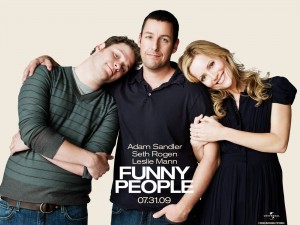 It might be the most plot-descriptive movie title since “40-Year-Old Virgin.”
It might be the most plot-descriptive movie title since “40-Year-Old Virgin.”
“Funny People,” Judd Apatow’s latest installment to what could be termed the “dick joke†genre, is a film featuring a flock of familiar funny folks and, yes, the formula forges a funny flick.
The immediate question: Where does it rank comedy-wise? It’s several inches short of reaching the bar set by “Knocked Up” and “Superbad,” but it’s a good foot above Apatow’s recent offerings (“Forgetting Sarah Marshall” and “Pineapple Express”). And if plot, acting and story depth count for much, it might be the director’s best work.
Adam Sandler, the lead, essentially plays himself as George Simmons, an actor/comedian who has attained fortune and fame. Apatow wastes little time in setting the stage as the second scene – following old camcorder footage of Sandler making prank calls in the ‘80s – puts Simmons in a doctor’s office, hearing the results of his blood tests revealed a rare form of leukemia. Realizing his mortality and reflecting on his life and comedic oeuvre, Simmons sets out to reconnect with his standup roots. He visits a dinky comedy club he hadn’t performed at since becoming “George Simmons.†There he meets Ira Wright (Seth Rogen), a deli worker and struggling up-and-comer whom he eventually hires as an assistant and joke writer.
Rogen excels in his typical role: the easy-to-relate-to charismatic goofball who finds himself in an awkward situation. In addition to penning stand-up material, Ira serves as Simmons’ sounding board (he’s the first to be told about his condition), advisor and quasi-best friend. He gets a taste of the good life as they travel together (via private jet) for shows and even share groupies… sort of. Much of the comedy comes from their unique relationship and playful banter.
Where “Funny People†diverges from its predecessors is the film’s emotion being generated by the severity of the situation. Naturally, cancer ranks above light-hearted plots like two stoners embarking on a weed-fueled adventure or horny high schoolers on an epic liquor run. Simmons’ condition doesn’t overpower the humor, but during the wacky happenstances and as the quips are cracked, the backdrop is in the back of the viewer’s mind – though the storyline isn’t nearly as forced and mawkish as in “Click.”
There are sympathetic points in which there is a drift from comedy and Apatow attempts to play pulmonary puppet master, but those moments are brief and there is never a great interval between laughs.
In one scene Simmons becomes ill in the early morning; he can’t sleep and, after remaining mostly composed and jovial during his ordeal, erupts in a moment of self-pity and frustration. But it quickly swings back to humor in the next scene, in a hospital, when a doctor attempts to explain the effects of his medication while Simmons and Ira mock the doc’s German accent.
The rapid-fire jokes, some of them improvised, are reminiscent of the “Know how I know you’re gay?†shtick in “40-Year-Old Virgin.” And there is plenty of that between Ira and George – particularly when George pokes fun at his assistant – and the supporting cast of class clowns, including Ira’s comedian roommates Leo (Jonah Hill) and Mark (Jason Schwartzman) supply a surplus of jocularity. Between that foursome, there isn’t a shortage of one-liners, celebrity and movie references and, of course, dick jokes. Lots of dick jokes.
The storyline begins to turn when Simmons, who had become emotionally ensconced in a comfortable but wonted existence, realizes what’s been missing from his life. You know, the rich guy standing in a million-dollar garden who hasn’t sniffed the roses. Enter Laura (Leslie Mann), George’s ex-girlfriend from more than a decade ago whom he still has feelings for. With the help of Ira, they reunite and rekindle… problem is she has a husband (Eric Bana) and two daughters (Maude and the adorable Iris Apatow).
Though the love story takes up a decent portion of the film, it isn’t central – gasp! – nor does it detract from the overall theme. And, without spoiling the plot, it doesn’t play out quite like the cynic would predict.
As well, Simmons doesn’t have the expected terminal illness epiphany and become a different person. Though he bends a little, his negative traits remain for the most part and unlike Apatow’s previous efforts, this one doesn’t have a bromidic happy ending. Not all the loose ends of Simmons’ life are tied up; the director makes the loop but doesn’t complete the knot. But that helps the film. It successfully maneuvers around cliché’s chasm.
The movie’s strength is its dialogue, as is the case with most of Apatow’s projects. The lines seem natural – what you’d expect from a bunch of funny people conversing – and the actors’ ability to freelance makes the characters seem real and relatable.
Another plus is the star-studded roster and the random (and weird) cameos. A drunk Sarah Silverman acting a fool in a bar; Andy Dick giving sound advice; Eminem cursing out Ray Romano in an upscale restaurant; RZA of the Wu-Tang Clan as Chuck, a deli worker, serving macaroni salad in a supermarket.
The knock: Sandler’s signature silly voices and corny impersonations are, well, corny. But if you were OK with them in his other movies, you won’t mind ‘em this time.
The movie’s glaring flaw is its length (145 minutes). Half an hour could have been shaved off the runtime without sacrificing much. The film drags near the end, probably an effect of Apatow’s wanting to throw a changeup and not put a bow on the story where most would have wrapped.
But one drawback – which many won’t even mind – doesn’t take much away from a quality work. It doesn’t classify as a must-see movie, but it’s a should-see. “Funny People†is well worth your time, if you have the time.

Leave a Reply